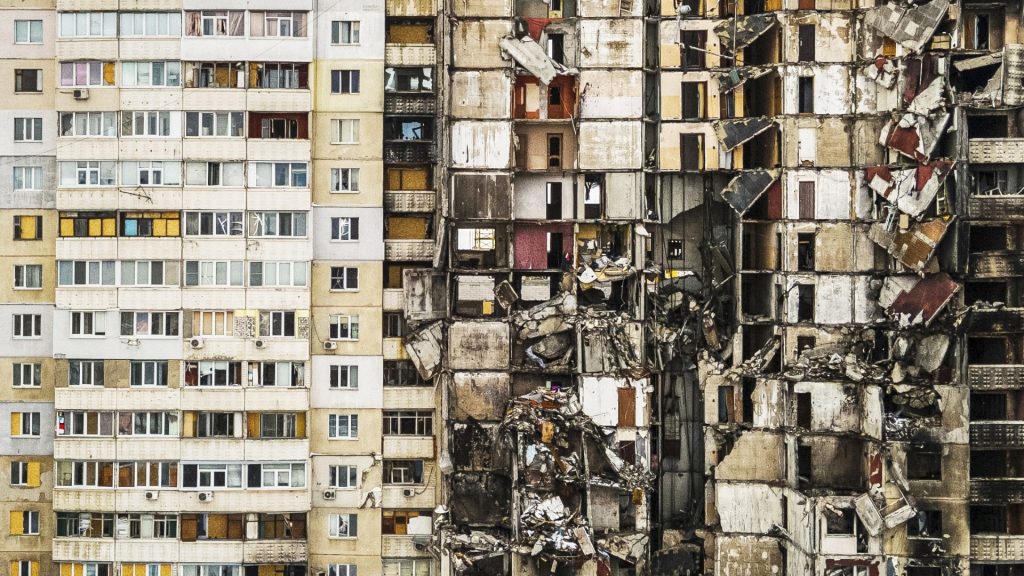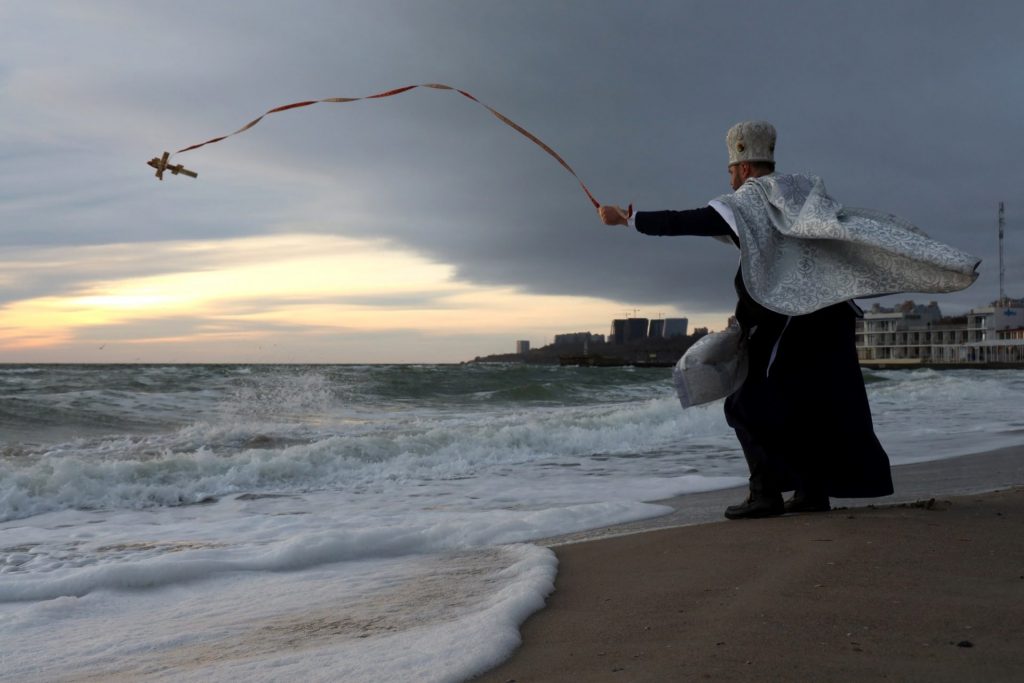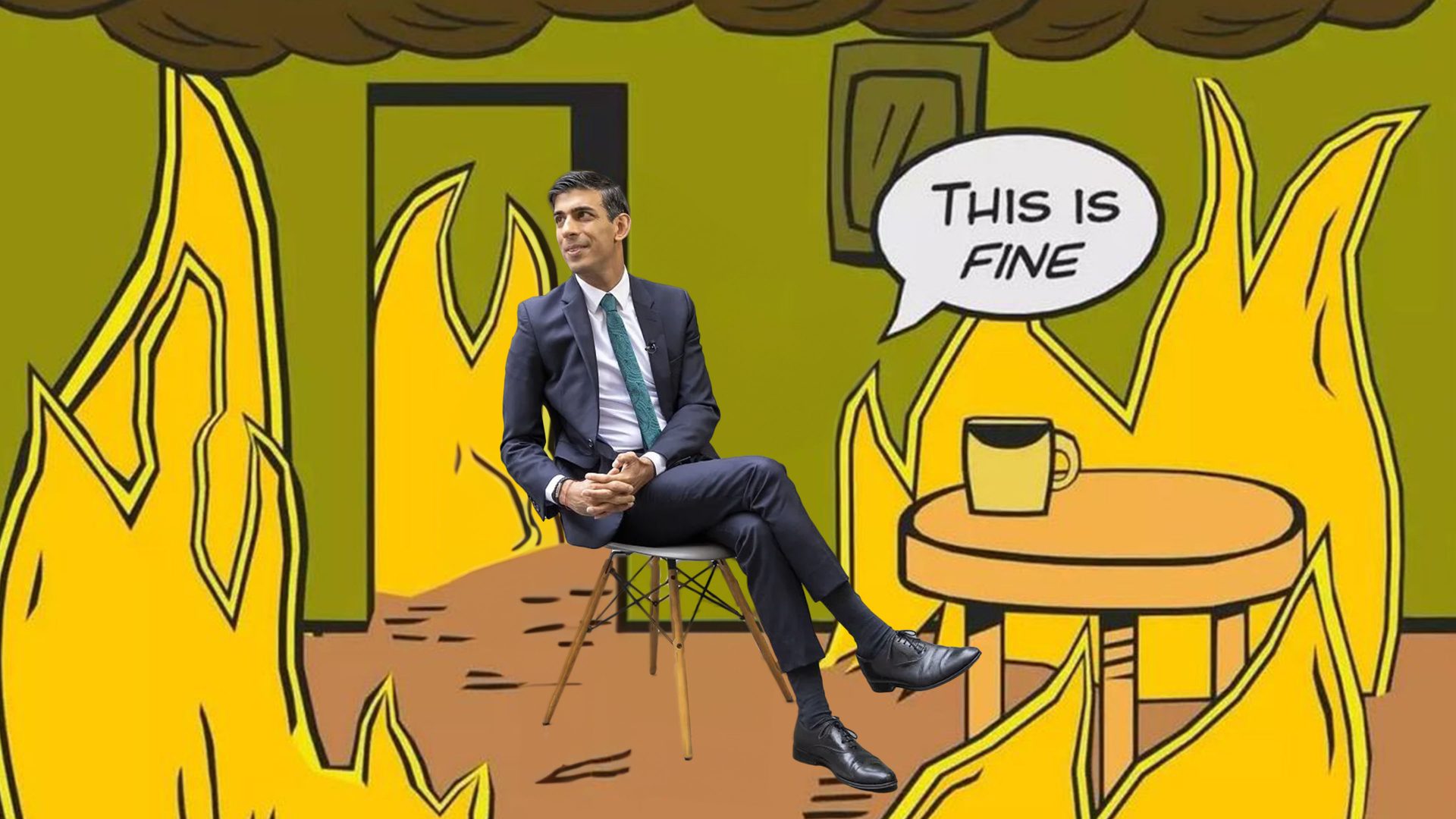On the day I call Petro Tulei he’s busy coordinating with rescuers trying to reach 17 miners trapped underground. Their coal mine, in Myrnohrad, 50km west of the Ukrainian frontline, was hit by two Russian missiles on January 5, one of which reduced the engine room to rubble.
Mr Tulei, an avuncular 66-year-old, is deputy chairman of the KVPU – Ukraine’s independent trade union federation. “We have members underground and members in the rescue team,” he says. And because time is tight, and the Zoom link unreliable, he gets straight to the point:
“We’re at the beginning of a third world war. What Europe needs to understand is that Ukraine is all that stands in the way of a barbaric army that wants to dominate the world. Its next objective is Europe, and Ukraine is the shield that is protecting Europe.”
The KVPU has thousands of members in the armed forces, and has seen over 200 killed. “Every day we get requests from our members at the front,” says Olesia Briazgunova, 35, the union’s international secretary: “for warm clothes, thermal underwear, food, medicine, coal, wood and the handmade heaters that we manufacture for use in the trenches.”
This is the untold part of Ukraine’s war story: supplies improvised by volunteer groups and ferried forward in pickup trucks, some donated by their western counterparts. Everybody knows that, as well as the headline items like tanks and missiles and the multibillion-dollar aid packages, this small-scale effort is just as critical.
After 26 years in the Soviet navy – he commanded a nuclear submarine in the Pacific Fleet – Mr Tulei is precise about what Ukraine needs from the west: “Air defence, electronic warfare equipment, long-range artillery and missiles, drones, F-16 aircraft, Apache helicopters and of course, ammunition.”
Everything, in short, that is being blocked by Republican lawmakers in Washington, by Viktor Orbán’s Hungary in Brussels and – in the collective western imagination – by fear of what might happen if Ukraine actually wins.
The year has opened with a flurry of western commitments to Ukraine. But the crucial language came from Joe Biden. On December 23, he told Volodymyr Zelensky: “We’ll continue to supply Ukraine with critical weapons and equipment as long as we can… but without supplemental funding, we’re rapidly coming to an end of our ability to help Ukraine.”
The language of “as long as it takes” has gone. Orbán’s blatant sabotage of a €50bn European aid package is driven in part by his ideological alignment with Putin, part by realpolitik. Though he has consistently sought to weaken EU sanctions against Russia, his ultimate motive is to bargain away the suspension of up to €30bn of EU funding, currently withheld due to his own breaches of European regulations.
He has pledged to go into the EU parliamentary elections in June this year campaigning hard against further aid for Ukraine. If other right wing populists take up that call, it could create a mutually reinforcing, transatlantic pincer movement to paralyse western responses.
And though the main suppliers of arms – the USA, UK and Germany – have pledged to go on giving, the scale of what’s supplied, and the conditions attached, simply do not match what Ukraine needs to meet the threat.
Looming over the conflict is the scenario that Trump wins in November, severely limits future aid to Ukraine and – as he threatened in 2018 – pulls the plug on US commitments to the defence of Europe itself, in order to prioritise China. If so, we have maybe 10 months to save Ukraine.
Putin has hiked his military budget to 6% and is preparing a full-scale mobilisation – both of the economy and manpower – after his inevitable re-election in March.
On January 2 we got a preview of what this might look like: Russia launched the largest missile strike of the war. It lasted six hours and – with a mixture of drones, cruise, ballistic and hypersonic missiles – overwhelmed Ukrainian air defences. With Iran making the drones, and North Korea supplying ballistic missiles, Russia is leveraging not only its own arms industry but those of its totalitarian allies.
On the ground, meanwhile, the Russian army continues to throw barely trained troops into “meatgrinder” offensives. But with large amounts of US ammunition allocated to Israel, and Republicans in Congress blocking further aid, Ukrainian defenders have lost the ability to achieve localised artillery superiority, allowing Russia to make incremental gains.

As a result, most briefings coming from western capitals now emphasise that 2024 will see Ukraine on the defensive. But Jade McGlynn, a research fellow at King’s College London, who has studied the war up close, warns there is a much more negative scenario: Russia could win.
“We consistently think about the war as if it’s going to be another frozen conflict. But if we continue not supplying Ukraine with weapons it isn’t going to win. And nobody seems to have factored in how much more powerful Russia would be if it takes Ukraine, both in terms of resources and geopolitical heft.”
Though Russia controls parts of only four Ukrainian provinces, they are home to $12.4tn worth of coal, oil and gas deposits – half the country’s pre-war totals. That’s why the miners of Myrnohrad are so determined to risk life and limb to bring the other half to the surface.
If Russia were to defeat Ukraine, enforcing geopolitical neutrality and economic client status on Kyiv, it would get a whole lot more than fossil fuels. Ukraine is home to the largest untapped lithium deposits in Europe. It produces 7% of the world’s titanium, is the sixth-biggest iron ore producer and seventh-biggest of manganese. If you add Ukraine’s wheat – 7% of global production – to that of Russia at 18%, you give Moscow a critical stranglehold on the world’s food supply.
This, says McGlynn, is why those in Washington arguing that America must seek compromise over Ukraine, in order to focus on confronting China, are mistaken: “If you had a country as rich in resources as Ukraine subjugated to Russia, and Chinese expertise moved in to extract these resources at scale, in a way the Ukrainians haven’t been able to do, I’m not sure the Republicans have thought through the impact of that.”
In addition to massively increasing the resource wealth of a Russia-China alliance, says McGlynn, the outcome would decisively weaken Europe.
“If we abandon Ukraine, even if a rump state remained, Putin would ensure it was essentially a failed state, with a lot of guns and a lot of angry men, annoyed at their betrayal by the west. In Russia, meanwhile, the Putin regime’s ideology – which seems absurd to us – is validated, and Russia becomes the key determinant of what happens to European security.”
What we’re seeing, says McGlynn, is not just failure of the western imagination, but a mismatch of ambitions. Western politicians imagine they can default back to the status quo. But Putin’s sights remain set, as in the draft treaties he proposed in December 2021, on a total overturn of the security order in eastern Europe.
The situation is saveable, and there’s no shortage of expert advice on how to save it. Ukraine has, in its favour, effectively neutralised Russia’s Black Sea Fleet. But it cannot match this with a decisive advance on land because it lacks air dominance, troops trained in complex manoeuvre warfare, and the ability to break through Russian minefields. Meanwhile, restrictions on both the supply and usage of long-range western missiles mean it cannot strike into the heart of Russia’s war machine.
So it’s in the west, above all in Europe, where the critical policy changes must take place.

“The first decision,” says McGlynn, “is to massively increase training for Ukrainian troops. Second, the west needs to invest in Ukrainian military innovations: they’ve got some brilliant technologists but what they cannot do is scale. Third, European defence ministries need to focus their efforts more on ‘ready to wear’ weaponry and less on the ‘haute couture’ approach, and of course make more ammunition.”
The question is, do key western political elites have the political will to do this? The battle is around cognition, says Benjamin Tallis, senior research fellow at the German Council on Foreign Relations. “This is not about charity, it’s about defending the west from aggression.”
Instead of simply providing air defence, he says, Berlin should be providing the Taurus cruise missile in large numbers, with permission to strike inside Russia.
“If we saw Germany taking this threat seriously, in the context of an uncertain US guarantee after this year’s election, we would see a genuine rearmament, not this pretend effort that’s going on at the moment, which is unlikely even to reach 2% of GDP.”
Britain, though it styled itself a leader in proactively supporting Ukraine under Boris Johnson, has not matched that rhetoric during the Rishi Sunak years. There was no mention in the autumn statement of a next tranche of aid for Ukraine, once the £2.3bn allocated for this financial year runs out. And the government’s pledge to spend 2.5% of GDP on defence remains an “aspiration”.
Where Boris Johnson, backed by then defence secretary Ben Wallace, effectively bounced western allies into supplying certain categories of weapons, Sunak has ceded leadership to Biden, and Biden is paralysed both by congressional opposition and the threat of Trump.
So the key changes may have to be initiated from within Europe, and out of pure self-interest.
“Without Ukrainian victory, there is no stable security order in Europe,” says Tallis. “First, because of the signal it sends to Moscow, that it’s OK to change borders by force. Second, because it shows the rest of the world that Europeans are not prepared to defend our values and our interests. Third, if we can’t handle a morally straightforward crisis on our doorstep, it gives very little hope that Europe can handle more complex, and multiple crises elsewhere.”
He believes that, if we fail to deter Russia now, European states – currently struggling to meet Nato’s 2% defence spending target – will face cold war levels of spending for decades, which were more than double that.
Petro Tulei, the Ukrainian union leader, agrees: “My appeal to Biden, Sunak and (Olaf) Scholz is not based on emotion or the principle of solidarity, but on the hard facts of finance. It will be cheaper to aid Ukraine now than to act within a second scenario, when the war spreads to Europe.”
By nightfall, he tells me, all 17 of the miners trapped in Myrnohrad have been brought to the surface: “But, as after every strike, our members will go back to their workplace tomorrow and carry on working. That’s another form of resistance.”
They know that, should the Ukrainian army’s ammunition run out, their choice will be to flee mines sunk by their great-grandparents, or to endure a regime that puts torture chambers on the high street, and is all too willing to drag trade union activists inside them. Meanwhile back in the present, on January 6 the Russians hit Myrnohrad with S-300 missiles, killing 11 people. Five of them were children.




